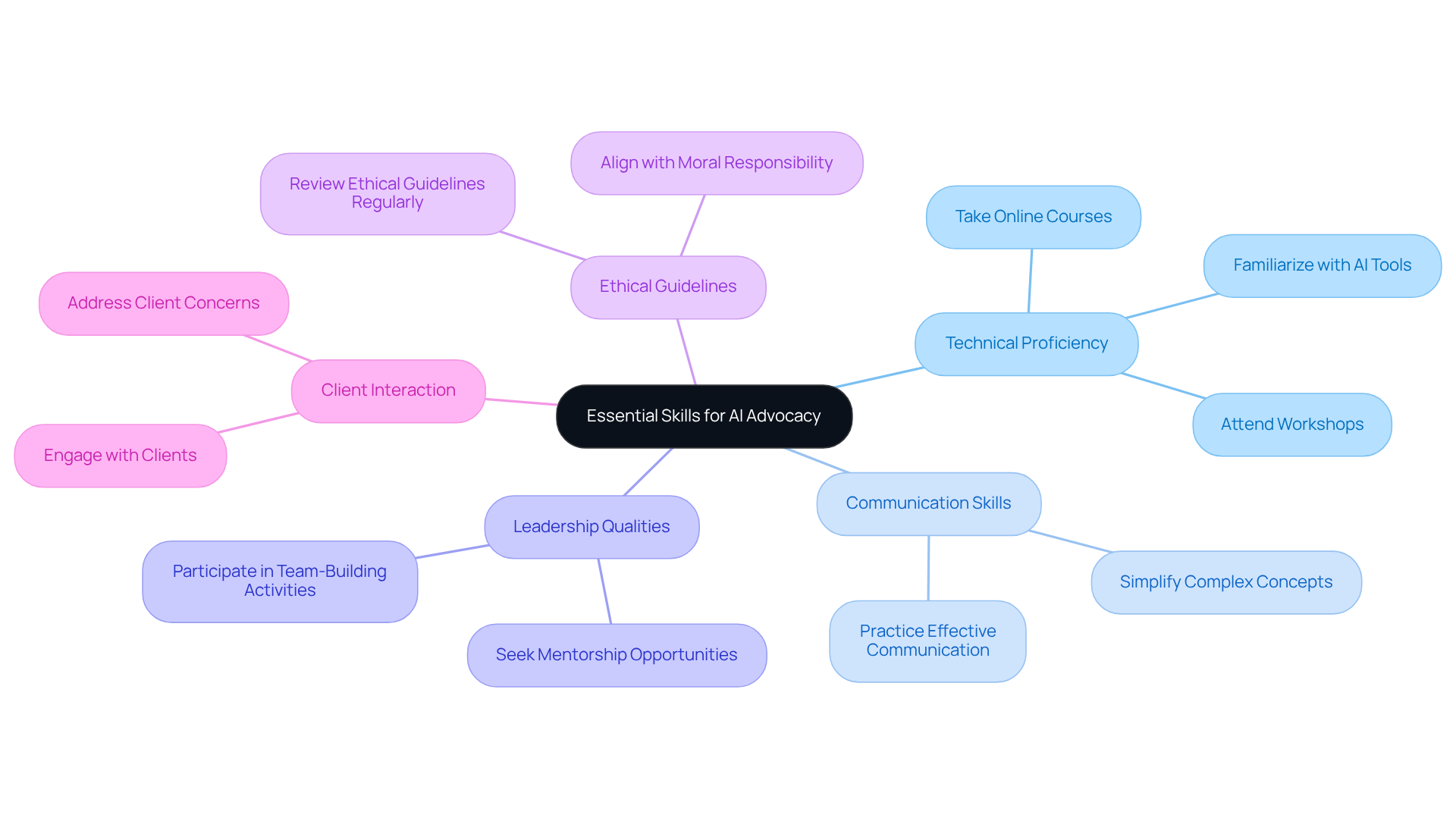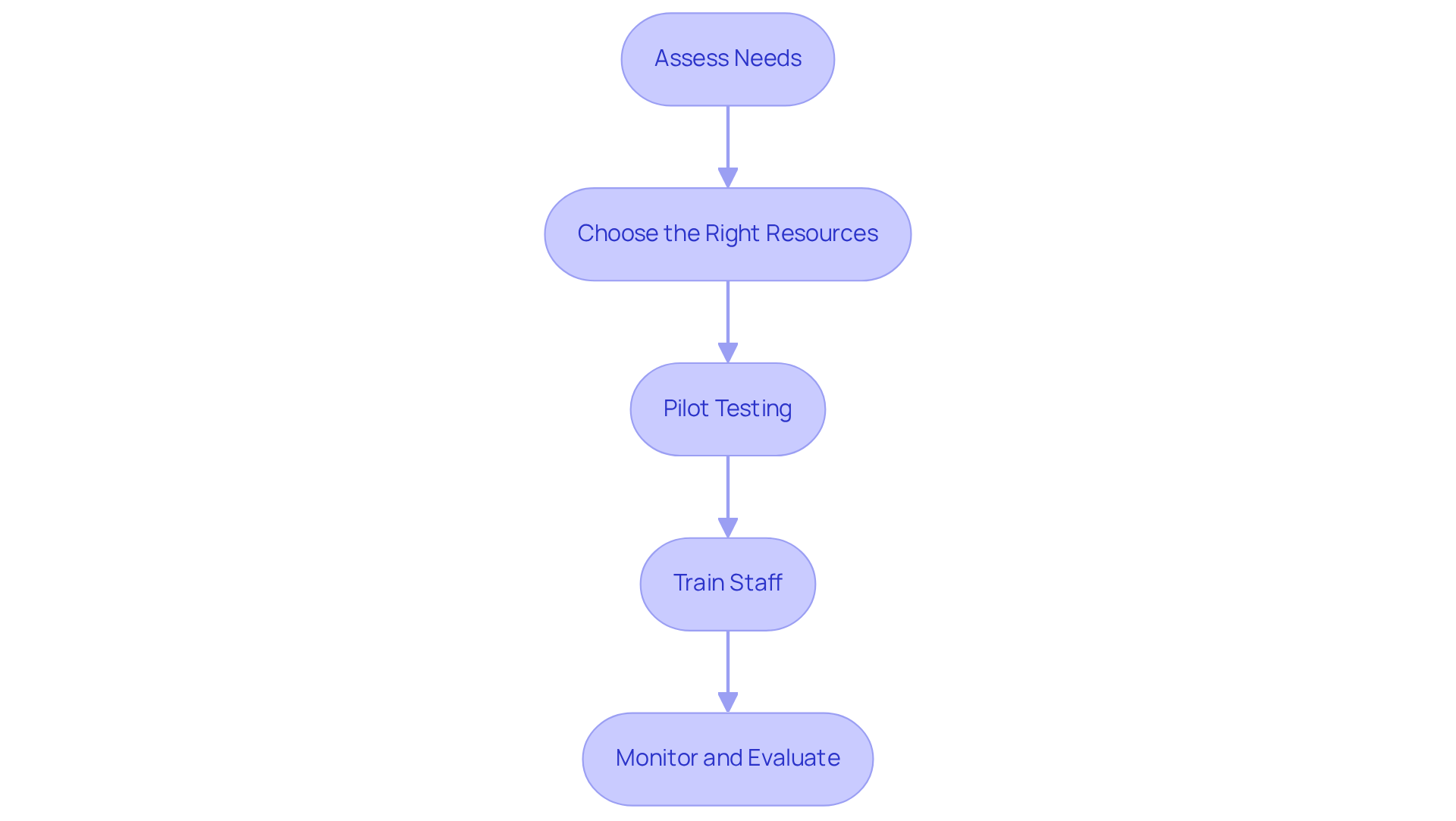Overview
In today's rapidly evolving healthcare landscape, providers face emotional challenges that can impact their ability to deliver exceptional care. The integration of artificial intelligence (AI) offers a promising solution, but it requires specific skills to become effective AI ambassadors. By focusing on these essential skills, healthcare professionals can enhance patient care and streamline clinical workflows.
Imagine the difference it could make if healthcare providers were equipped to educate their colleagues about AI, facilitate training sessions, and promote its ethical use. These responsibilities are not just tasks; they are vital competencies that can significantly improve operational efficiency and patient outcomes in medical practices. How can we ensure that our teams are prepared to embrace these changes?
Consider the administrative burdens that often hinder patient interactions. By becoming proficient in AI, healthcare providers can alleviate these pressures, allowing them to focus more on what truly matters—their patients. This shift not only benefits providers but also enhances the overall patient experience.
To support this transformation, we encourage healthcare professionals to engage in ongoing education and training. By fostering a culture of learning and collaboration, we can create an environment where AI is used ethically and effectively. Together, we can navigate the complexities of healthcare with compassion and expertise, ensuring that every patient receives the care they deserve.
- Educate colleagues about AI
- Facilitate training sessions
- Promote the ethical use of AI
By taking these steps, healthcare providers can become champions of AI, ultimately leading to better outcomes for patients and a more fulfilling practice for themselves. Let’s embrace this opportunity to grow together.
Introduction
The integration of artificial intelligence in healthcare is not merely a technological advancement; it signifies a transformative shift in how we deliver patient care. Many healthcare providers face emotional challenges as they navigate the complexities of modern medicine. With AI reshaping clinical workflows and patient interactions, the emergence of an AI ambassador becomes essential. This role supports healthcare professionals in advocating for AI, ultimately enhancing patient outcomes and streamlining processes.
How can healthcare providers harness these tools to improve their practices and elevate the overall patient experience? By effectively embracing AI, providers can alleviate some of the administrative burdens that often detract from patient care, allowing them to focus on what truly matters: the well-being of their patients.
This article explores the essential skills and responsibilities that empower healthcare professionals in this advocacy role. Together, we can navigate the evolving landscape of healthcare, ensuring that technology serves as a partner in delivering compassionate care. Let’s delve into how we can foster a supportive environment for both providers and patients alike.
Understand the Role of an AI Ambassador in Healthcare
An AI ambassador in healthcare acts as a crucial connection between technology and patient care, promoting the integration of AI resources that improve clinical workflows while emphasizing patient engagement. This role is essential in addressing the emotional challenges healthcare providers face. Here are their key responsibilities:
-
Educate Colleagues: AI Ambassadors inform peers about the benefits and features of AI resources, nurturing a culture of innovation within their practice. This education is crucial, as studies show that 68% of physicians recognize advantages in using AI, reflecting a growing acceptance of these technologies.
-
Facilitate Training: They organize training sessions to ensure staff become proficient in AI technologies, promoting comfort and confidence in using these tools. Effective training is vital, as the incorporation of AI can significantly lessen administrative burdens, enabling providers to focus more on client support.
-
Monitor Implementation: The AI ambassadors are responsible for overseeing the integration of AI solutions, assessing their effectiveness, and making necessary adjustments to optimize workflows. This oversight is crucial, as successful implementation can lead to improved outcomes and satisfaction for those receiving care.
-
Gather Feedback: Collecting input from staff and individuals is essential to understand the impact of AI on service delivery and identify areas for enhancement. Engaging with stakeholders ensures that AI tools meet the needs of both providers and users.
-
Promote Ethical Use: They ensure that AI applications align with ethical standards, particularly those rooted in Catholic teachings, maintaining the integrity of patient treatment. This commitment to ethical practices is increasingly significant as AI technologies advance and become more embedded in medical care.
By embracing these roles, medical providers can position themselves as AI ambassadors, which ultimately enhances the quality of care they deliver. The incorporation of AI resources not only streamlines processes but also has the potential to improve patient outcomes. How can you, as a healthcare provider, engage with AI to transform your practice and elevate patient care?

Develop Essential Skills and Knowledge for AI Advocacy
To become an effective AI ambassador, healthcare providers should cultivate a blend of technical and interpersonal skills. How can you develop these essential competencies to enhance your practice and improve patient care?
Gain Technical Proficiency: Familiarize yourself with the AI tools available in your practice, such as intelligent scheduling systems and electronic health records. Understanding their functionalities, benefits, and limitations is essential for streamlining administrative tasks and improving care for individuals. Consider taking online courses or attending workshops focused on medical AI to stay updated on the latest innovations.
Enhance Communication Skills: Strong communication is key to advocating for AI. How often do you find yourself explaining complex AI concepts? Practice simplifying these ideas to ensure that all staff members grasp their importance and functionality. This is particularly important as effective communication can help consolidate disparate systems and improve patient-physician interactions.
Build Leadership Qualities: As an AI ambassador, you will need to inspire and lead your colleagues effectively. Develop leadership skills by participating in team-building activities and seeking mentorship opportunities. Your ability to guide will be crucial in promoting a cooperative approach to medical care that utilizes AI for improved outcomes.
Stay Informed on Ethical Guidelines: Understanding the ethical implications of AI in medical practice is crucial. Regularly review guidelines from reputable sources, particularly those that align with Catholic teachings, to ensure that your advocacy is grounded in moral responsibility. This knowledge will help you navigate the complexities of AI implementation in a patient-centered manner.
Interact with Clients: Build connections with clients to comprehend their viewpoints on AI in medical services. How can you better advocate for tools that enhance their experience? Engaging with clients will help you address their concerns and encourage their involvement through technology, creating a more collaborative medical setting that empowers individuals and enhances health outcomes.
By concentrating on these aspects, healthcare providers can effectively promote AI, ensuring that technology acts to improve service rather than detract from it. Together, let's embrace these changes for a brighter future in healthcare.

Implement AI Solutions in Your Practice
Successfully implementing AI solutions in your practice involves several key steps that can alleviate the emotional and administrative burdens you face:
-
Assess Needs: Begin by evaluating the specific administrative and clinical needs of your practice. What areas could AI help alleviate burdens and enhance efficiency? For instance, Portsmouth Hospitals increased maternity appointment capacity by 33% through intelligent automation, showcasing how an AI ambassador can optimize scheduling and enhance patient care.
-
Choose the Right Resources: Research and select AI resources that align with your practice's needs and values. Consider factors such as ease of use, integration capabilities, and adherence to ethical guidelines. As healthcare leaders emphasize, choosing resources that improve work-life balance and career opportunities is essential for cultivating a supportive environment.
-
Pilot Testing: Before a full rollout, conduct a pilot test of the selected AI resources. This allows you to gather insights on their effectiveness and make necessary adjustments based on real-world feedback. For instance, AI-driven user-facing chatbots have shown promise in improving user engagement and simplifying customer service interactions.
-
Train Staff: Ensure that all team members receive comprehensive training on the new AI tools. This training should cover both technical aspects and the ethical considerations of using AI in healthcare. A well-trained team can function as an ai ambassador to leverage AI and enhance healthcare outcomes while adhering to the ethical standards of the field.
-
Monitor and Evaluate: After implementation, continuously monitor the performance of the AI tools. Gather information regarding their effect on workflow efficiency and client satisfaction, and be ready to implement iterative enhancements. The American Medical Association emphasizes that an AI ambassador can significantly reduce administrative burdens, allowing medical professionals to focus more on their clients' needs.
By following these steps, healthcare providers can effectively integrate AI solutions into their practices, enhancing both operational efficiency and patient care. Remember, you are not alone in this journey; embracing AI can lead to a more fulfilling practice and improved patient experiences.

Conclusion
Becoming an AI ambassador in healthcare offers a transformative opportunity for providers to connect cutting-edge technology with compassionate patient care. This role is essential in nurturing a culture that embraces AI, ultimately improving the quality of care delivered to patients. By stepping into this position, healthcare professionals can advocate for AI resources that streamline processes, enhance efficiencies, and elevate patient engagement.
AI ambassadors have several key responsibilities, such as:
- Educating colleagues on the benefits of AI
- Facilitating training
- Monitoring implementation
- Gathering feedback
- Promoting ethical use
These tasks empower healthcare teams and ensure that AI technologies align with the values of patient-centered care. Moreover, developing technical skills, enhancing communication, and building leadership qualities are crucial for navigating the complexities of AI in healthcare effectively.
As the healthcare landscape continues to evolve, embracing the role of an AI ambassador is not just beneficial; it is imperative. Providers are encouraged to engage actively with AI, not only to improve their practices but also to foster a collaborative environment that prioritizes patient well-being. By taking these steps, healthcare professionals can lead the charge in integrating AI solutions that enhance operational efficiency and the overall patient experience, paving the way for a brighter future in healthcare.




